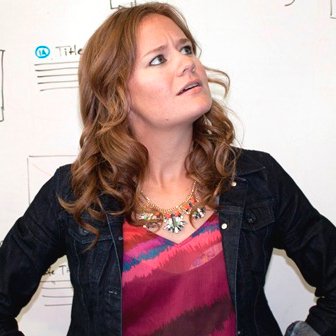
Home Depot’s SEO Manager Erin Everhart spoke with Engage Magazine about the company’s SEO focus and strategy.
Everhart is an experienced digital strategist, content developer and search marketer and has previously worked agency-side for mid-sized business and Fortune 500 companies. She speaks regularly on digital strategy, content development and inbound marketing at conferences nationwide, including Pubcon, SMX and ClickZ Live.
LB: What is the main SEO focus for you at Home Depot?
EE: I focus on three things: quality, sustainability and user-centered SEO.
“We need to stop marketing to search engines and start marketing to the users that use search engines, and that factors into everything we do: the content we create, the pages we build, the way our SERP results look,” said Home Depot’s SEO Manager Erin Everhart.
There are so many different ways to do SEO, and even with Google’s constant push to improve their algorithms and the quality of SERP [search engine results page] results — spam tactics will always exist and it may even work for a little bit. But it won’t last. When I get a No. 1 ranking, I don’t want to have to constantly be looking over my shoulder to make sure I’m still there. I want to trust in my methods, and I want to stay there for months and years down the road. Sure we’re looking for quick wins, but ultimately only if those wins will be maintained over a long period of time.
That goes into the most important element of ‘new SEO’. It’s all about the user. We need to stop marketing to search engines and start marketing to the users that use search engines, and that factors into everything we do: the content we create, the pages we build, the way our SERP results look. It should be no surprise that Google is focusing so much on usability because improving the customer experience improves our organic experience.
“The only way I know how to adjust and adapt is to be as prepared as possible about not just what happened, but what’s going to happen. If you stay up to date, you’ll be able to see where algorithms are going long before a change actually takes place,” she said.
LB: What is Home Depot’s approach to SEO? What do you do to carry out good SEO practices?
EE: I’m obsessed with data. I strive every day to make sure we’re doing the right thing, not just from an for SEO, but for the overall business. SEO doesn’t just happen in a vacuum; I’m constantly thinking about how page changes I want to make would impact the overall business, not just the organic search channel. Sometimes that’s also what’s best for SEO; sometimes it’s not.
“So many times I read that brands don’t have to worry about algorithm updates, or building links or ranking well because ‘Google favors brands,’ but it’s the exact opposite. I worry about that stuff every day,” Everhart said.
LB: SEO algorithms have changed significantly in the last few years, and consumers are doing more searches per person. How do you adjust or adapt to SEO trends and changes?
EE: I’m extremely lucky to work with some seriously knowledge-hungry people at Home Depot. The only way I know how to adjust and adapt is to be as prepared as possible about not just what happened, but what’s going to happen. If you stay up to date, you’ll be able to see where algorithms are going long before a change actually takes place.
So many times I read that brands don’t have to worry about algorithm updates, or building links or ranking well because ‘Google favors brands,’ but it’s the exact opposite. I worry about that stuff every day. I can’t rest on my laurels on Home Depot’s domain authority that we’ll always have a good organic presence because there’s been too many examples of too many big brands — JCPenney, Overstock, eBay — getting hit because they were too focused on gaming the system.

by homedepot via Instagram
LB: What have you/Home Depot tried with SEO that you have seen success with? What kind of results did you get out of that effort?
EE: Recently, I’m seeing that content placement is helping more than just having a lot of content. My colleague shared this great article about content quality score from Mace Dynamics, which talks about how search engines read and even interpret the content on your page. The higher the content, the quicker search engines see it, the more value they place on it, the better you’ll perform.
LB: What are some of biggest challenges you’re working on with SEO at Home Depot?
EE: The biggest challenge I’m working through has to deal with proving value. I am so lucky to have so much data available to me, but it’s a challenge in A) knowing what metrics are the ‘right metrics’ and B) understanding how to analyze it correctly to know the story those numbers are trying to tell you. Trailing off of that is figuring out a better way to estimate traffic and more important revenue from an increase in ranking. I hate relying on CTR [click-through rate] distribution studies because they’re wildly inconsistent and rarely representative of the actual CTR you’d expect when you do get that ranking. Instead, I like to focus on real, hard data that we actually have and is proven, but that’s not always the easiest problem to solve.
What's your most valuable game day tailgating tool? Show us with #LetsDoGameDay! pic.twitter.com/JsmrXFMn19
— The Home Depot (@HomeDepot) October 11, 2014
LB: What is the focus of Home Depot’s content marketing strategy? How much is SEO a part of that?
EE: It’s pretty simple: Put out content that our users are actually interested in. From there, I make sure we link to the right places on our site and are driving users further through the buying process. It can be the most well-written content out there, but if it’s not pointing people to an action (for us, where they can buy a similar product), then it’s not doing its job.
“If you’re writing content just for the sake of search engines and not writing content your users actually want, you’re wasting time and valuable resources when that same content could be working for both marketing tactics,” she said.
LB: How do you plan with SEO strategy? How do mobile, social other platforms play into it?
EE: This follows up a little from your second question: It’s all about the data. When I’m thinking about my 2015 SEO plans, I don’t think in terms of most searched keywords to focus on. I start first with the company’s biggest sellers and highest profit margins. Once I know that, I look to see how they’re performing in organic search. I find their opportunities and I find where we may be falling short and put together an action plan then.
It may not include the highest searched terms, but making even an incremental impact on the lines of business that make the company the most money will matter more (and frankly, be a little easier) than making huge changes to something we don’t sell a lot of.
Start to Finishes: Dining Room Makeover
by The Home Depot via YouTube
LB: A leading SEO expert and co-founder of Moz Rand Fishkin said recently that content marketing is SEO. In your experience, what are your thoughts about this?
EE: I wrote a little about this over at Search Engine Land in how content marketing doesn’t equal link building, and I don’t think it equals SEO either. Content marketing is creating content to move your users through your marketing funnel. SEO is optimizing your website for search engines. Both should absolutely work together, but the terms aren’t interchangeable.
For example, if SEO isn’t a part of your promotion strategy to get people to your content in the first place, then you’re missing a huge opportunity. Conversely, if you’re writing content just for the sake of search engines and not writing content your users actually want, you’re wasting time and valuable resources when that same content could be working for both marketing tactics.
LB: Fishkin also said in a recent presentation that SEO is not a job, it’s a job description. What are your thoughts?
EE: [I] completely agree, and even more so, SEO should be a little part of everyone’s job description, at least [to] everyone who works in the online space. I’m guilty of this, but I hate when we just identify ourselves as ‘SEOs’ because the best ‘SEOs’ touch and impact way more than just search engines. We’re first and foremost digital marketers who have a specialty in SEO.
Click here to see how Rock Content can help you measure your content’s engagement and use that to achieve business goals.
2024 State of Marketing Report
Your golden ticket to crush your goals with data-driven insights!
2024 State of Marketing Report
Your golden ticket to crush your goals with data-driven insights!







